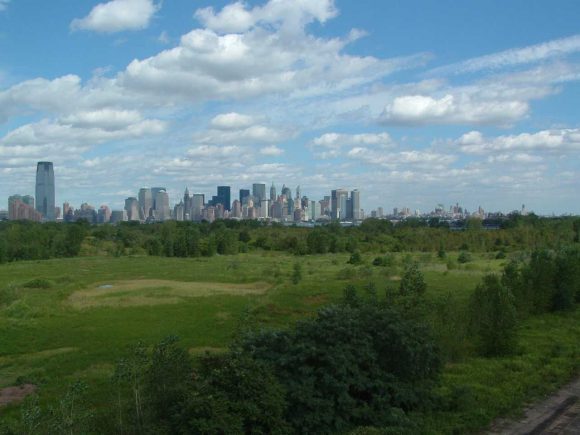
Liberty State Park.
The Center for Resilient Landscapes (CRL) is a new collaborative research effort of the Rutgers School of Environmental and Biological Sciences, the New Jersey Agricultural Experiment Station, and the USDA Forest Service Northern Research Station. The objective of the center is to focus on the development of social-ecological system resilience–from short-term recovery to longer-term restoration–and fundamental system re-organization or resilience. CRL personnel are studying and supporting improved stewardship of urban and rural natural resources and their linkages to enhanced community wellbeing, public attitudes and behaviors, and sound policymaking.
Initial research emphases of the center include:
1) Understanding resilience within complex landscapes under conditions of global change, periodic disturbance, and urbanization;
2) Evaluating strategies for increasing socio-ecological resilience; and
3) Designing scientifically informed tools to facilitate state and community responses to natural disturbances and extreme events.
To further this effort, the center is funding post-doctoral research to develop an applied socio-ecological simulation model of governance and ecological processes to address current and future challenges in forest resilience in the face of changing human development and climate regimes. This line of research is focused on the study of disturbance regimes prevalent in New Jersey and the surrounding region. The current application for this model is the spread of emerald ash borer in New Jersey, but the model is designed to be adjusted to any disturbance, including fire in the wildland-urban interface, extreme storm events, developmental pressures, pests and invasive species, and changing economies and markets.
In addition, the center is currently supporting four fellowships that serve research projects through the USDA Forest Service Philadelphia Field Station, the New York City Urban Field Station, and the Silas Little Experimental Forest in New Jersey. The four research projects include a study of forest fragments in urbanized areas, a long-term analysis on the effects of emerald ash borer, the development of a new technique to estimate surface fuel loads for forest fire management, and an understanding of how an ecological restoration experiment can be a catalyst for new forms of civic engagement.
Since its establishment in 2014, the Center for Resilient Landscapes has been highly successful in creating opportunities for collaborative research and growing a network of cooperation, exchange, and expertise. The development of the center has led to several joint Rutgers and Forest Service training opportunities for graduate, doctoral, and post-doctoral researchers in projects that would have been difficult, if not impossible, to undertake without this partnership and sharing of resources.
This story originally appeared in the New Jersey Agricultural Experiment Station 2017 Annual Report.

